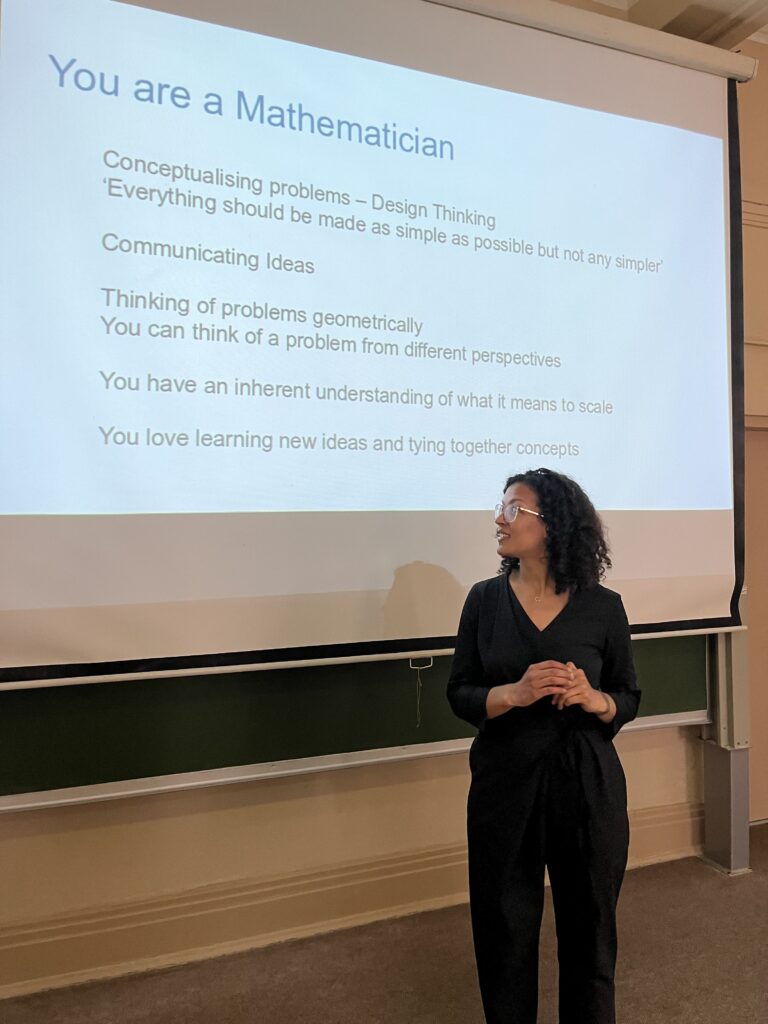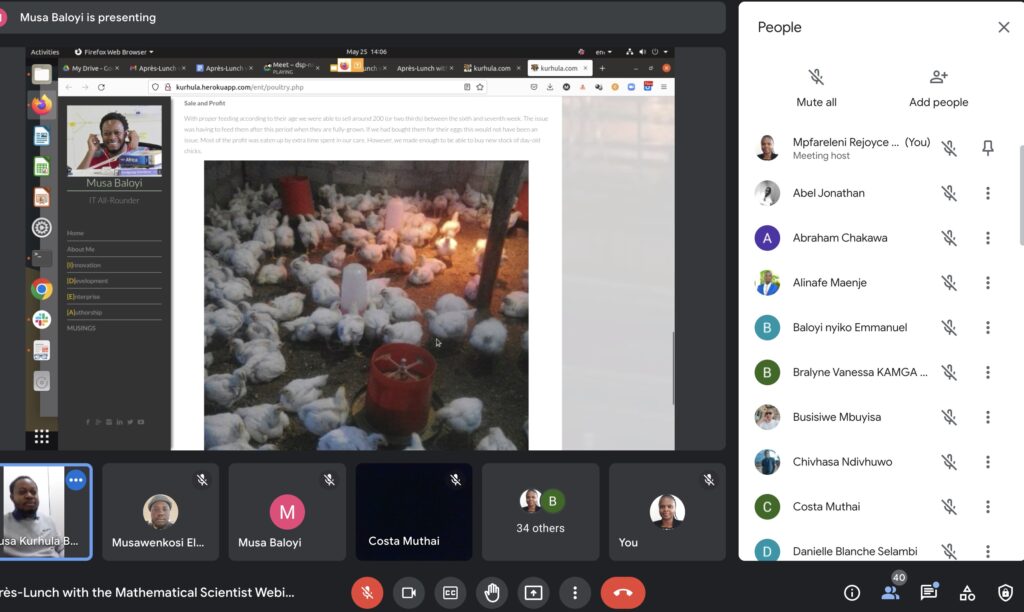On 11 and 25 May, two Après-Lunch events were held. The events provide a conducive environment for students, researchers, and mathematics devotees to interact with mathematical scientists/role models working in academia/industry and other sectors. The events thus enable graduate students to meet potential mentors in their careers and foster collaboration amongst the researchers.

The 11 May event was hosted in commemoration of the International Day of Women and in Mathematics. It took place at AIMS South Africa. The participants were AIMS students and researchers. The speaker of the day was Ms Emily Muller, an AIMS Alumna and a PhD Student in Data Science at the Imperial College London, UK. The event focused on “Career/Research Advancement in Data Science”. Ms Muller shared the critical career benefits of being trained at AIMS in her current PhD research study. Her PhD research study focuses on the use of Street View imagery to interpret environmental features which can explain variance in urban health outcomes using unsupervised clustering and computer vision methods.
She encouraged the students to identify their unique selling points as aspiring mathematical scientists. Furthermore, she encouraged them to take advantage of network opportunities and resources provided by AIMS. She went further that they should communicate research ideas clearly; be accountable and responsible to build trust with collaborators, ask questions and share ideas; build and sustain relationships with colleagues (possible future collaborators), and learn the language of their supervisors. She invited participants to participate and contribute to her perceptions of the Walkability of London city streetscapes (captured by imagery) hosted at www.pulselondon.co.uk as part of her PhD final year project.

On 25 May, Apres Lunch hosted Mr Musa Kurhula Baloyi, a 2012 AIMS South Africa Alumnus and a Machine Learning Engineer. Mr Baloyi is a Founder of Madyondza Consulting and currently works as an Independent Consultant. He is also a Software Developer with vast industry experience (over ten years) in various roles within the IT spectrum. The event focused on “Career Advancement in Entrepreneurship and Business Development”. He shared first-hand insights on how he transitioned from academia (mathematical sciences) to entrepreneurship, and the challenges he faced when starting his businesses. For mathematics graduates who want to embark on the entrepreneurial career path, Mr Baloyi recommended the following points:
- Full-time employment
According to him, “this is important to gain hands-on and industry knowledge and skills. This will help [the students] understand the business domain, what issues they are facing and what you can do to tell solve for them. This is a good initial start for any business person. By using [their] mathematical thinking and physical problem solving, [they] can then solve for real problems currently being experienced by customers”.
- Entrepreneurship/startups
He went further that entrepreneurship “is a more risky route. [The students] need good financial backing and resilience to weather the storms. One way to do this is to apply for startup and/or government funding. But funders must be in it for the long haul, and not expect miraculous results in less than 3 years. Funding that needs long term projections is not being realistic, as things change quickly when doing business – the Covid pandemic is a case in point. However, projections in business plans can help you think through a lot of scenarios, which can be very helpful in planning and running a business”.
- Consulting and contracting
This is the route Mr Baloyi is currently on. He shared: “I get to work on different problems for a myriad of clients, giving me exposure and experience in a variety of environments. I get the opportunity to make business decisions, and account to myself and non-performance can have serious consequences as I’m not protected by any labour laws. This teaches accountability, resourcefulness, and good financial planning – which are all skills needed to run a successful business”.
- Intrapreneurship
Mr Baloyi shared his views, now concerning intrapreneurship: “I’ve done this while working for both IBM and ThoughtWorks. It’s about taking what you learn on the job and going beyond your day to day job to create something like a product or an organisation internally. This has the advantage of getting company backing, financing and resources support. For example, if you work for a cloud company, you might get free cloud resources. You can also tap into the skills of your colleagues at no cost. I’ve done this with Lotus Mashups at IBM (using the IBM Lotus platform and internal IBM intranet to create a mashup website with internet and intranet components) as well as at ThoughtWorks where the Madyondza brand started to take shape. Here I had meetups funded by ThoughtWorks where we brainstormed and created digitisation and localisation content, and even supported local businesses with food orders. See my articles on Localisation and Digitisation in Africa, the 10k Mark (on my blog), Introducing Madyondza Meetups, presentation for Social Media Week by Tsatsi Mahase & myself, as well as Agile Manifesto Translation into Xitsonga. These are all products of intrapreneurship building on top of the First Online Tsonga Dictionary pet project I started while a student at Wits in 2010. Some of the content from that project can be found at madyondza.blogspot.com.
- Career Trajectory
For him, his career journey was not straightforward. He elaborated: “I worked and studied and did business in turns or all at the same time. Some of the businesses I did were poultry farming, cattle farming, property rentals, game lounge, and consulting for startups. Yours will likely follow its own path, so don’t try to emulate mine. Choose what’s best for yourself, your personality, your interests as well as your environment. Read more HERE about his projects.
The online participants include AIMS students and alumni, students from other African universities and professionals working in the industry.

